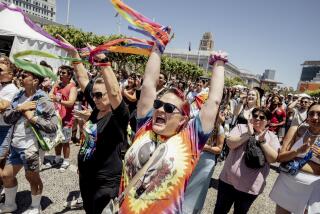Despite incidents, gay travelers are feeling less of a chill
FOR lesbians and gay men looking to hit the high seas or vacation abroad, this month brought events both giddy and unsettling. Taken together, they say much about the possibilities and perils of uncloseted travel:
* Gay tour companies chartered two crown jewels of cruising: Cunard’s Queen Mary 2, arguably the best-known passenger ship afloat, and Royal Caribbean’s Freedom of the Seas, soon to debut as the world’s biggest, carrying up to 3,700 guests. Each ship will make an all-gay sailing next year.
* Nearly 100 tourist bureaus and companies staffed booths at a gay and lesbian travel expo in West Hollywood. The big names included AAA Travel, American Express, Abercrombie & Kent, the Tourist Office of Spain and Germany’s Lufthansa Airlines.
* Two CBS News journalists vacationing on the Caribbean island of St. Maarten were badly beaten outside a bar, allegedly by several men who taunted them with anti-gay slurs.
* HBO released a documentary, “All Aboard! Rosie’s Family Cruise,” about the 2004 inaugural sailing, with 1,600 passengers, of Rosie O’Donnell’s family-friendly gay cruise company. In Nassau, the ship was met by demonstrators toting bullhorns. Among their signs: “I don’t welcome ‘sissies’ in the Bahamas.”
For the newly visible gay traveler, the world is not always a welcoming place, but more doors, and ports, are opening.
Within the U.S., new places are pitching to gay men and lesbians. Such marketing, pioneered by cosmopolitan cities on the coasts, is migrating to the heartland.
The Dallas Convention & Visitors Bureau this year launched a new website, www.glbtdallas.com, touting the city’s gay-friendly hotels, bars and events. The Big D, the site says, “has left behind stereotypes of big-haired women and rowdy cowboys -- that is, unless you count sassy drag queens and strapping gay rodeo champs.”
On tamer tourist websites, Tempe, Ariz., proclaims itself “progressive” and “inclusive,” and Bloomington, Ind., claims to have the nation’s fifth-largest per-capita population of same-sex couples.
A major motive for marketing to gays appears to be money. It’s the green on the rainbow flag that catches the travel industry’s eye, insiders say.
Gay men and lesbians are thought to account for at least $65 billion, or 5%, of the $1.3-trillion U.S. travel market, according to Community Marketing Inc., a San Francisco marketing company. The actual figure may be higher, the company says, because gays, on average, take more leisure trips than non-gays.
“Destinations are popping up and saying, ‘We want a share of that,’ ” said Tom Nibbio, membership and development manager for the International Gay & Lesbian Travel Assn., based in Fort Lauderdale, Fla.
His trade group claims more than 900 members, including tourist boards, travel agents, hotels and others in the industry.
Gay travel, once regarded as a limited niche, Nibbio said, is generating its own niches as more companies specialize in adventure outings, lesbian- and family-oriented trips, and excursions to Canada for same-sex marriage ceremonies, which are legally recognized there. You can search for gay trips and travel agents on the IGLTA’s consumer website, www.traveliglta.com.
More foreign destinations also appear to be hoisting the rainbow flag.
In January, the Cayman Islands hosted 3,200 gay men and lesbians from Royal Caribbean’s Navigator of the Seas, albeit with a few protesters on hand.
Eight years earlier, the religiously conservative British territory had turned away another ship chartered by the same gay travel company, Atlantis Events Inc. of West Hollywood. In a letter then, the Caymans’ tourism minister had written that “we cannot count on this group to uphold the standards of appropriate behavior expected of visitors to the Cayman Islands.”
A change of heart, and law, ensued: In 2001, the Caymans adopted a nondiscrimination policy.
“I see a lot of positive change happening,” said Rich Campbell, chief executive of Atlantis Events, which is chartering Freedom of the Seas.
Despite the 2004 protest organized by two church groups against O’Donnell’s cruise in Nassau, the Bahamas government welcomed the ship, said Gregg Kaminsky, a founding partner in the cruise company, R Family Vacations. And gay charters, which frequently drop anchor off St. Maarten, say they get friendly receptions there.
“Most of the Caribbean, I think, is welcoming and is getting even better,” said Paul Figlmiller, president of RSVP Vacations in Minneapolis, which chartered the Queen Mary 2.
One exception, he and Campbell said, has been Jamaica, where sodomy is illegal. In response, Jamaica’s tourism minister, Aloun N’dombet-Assamba, said, “Everyone is welcome in Jamaica, and we don’t discriminate against any one person or group.”
Although crimes directed at gay tourists abroad may get publicity, experts say, the danger can be overblown. They point out that homosexuals don’t have to leave America to experience such violence.
In 2004, there were 567 recorded assaults, including one resulting in a fatality, on homosexuals and bisexuals in the U.S., according to the most recent FBI report on hate crimes. That was about half the number of hate-motivated attacks on blacks and twice the number on Hispanics.
Anti-gay protests too are not just a foreign phenomenon. Annual gay-pride parades and allied events in the U.S. often draw counter-demonstrators.
Nevertheless, when going abroad, “We ask our guests to try to respect the culture we’re visiting,” Figlmiller said.
Britain’s Foreign & Commonwealth Office, which advises its citizens on travel, devotes a section of its website, www.fco.gov.uk, to gay, lesbian, bisexual and transgender travelers. Click on “Travel Advice,” then “Travel Checklists,” and choose “Gay & Lesbian Travellers.” (The U.S. State Department’s travel website does not have a comparable section.)
Among its tips:
* Research the laws and customs of the country you plan to visit, including the age of consent and attitudes about same-sex relationships.
* Remember that rural areas are often less tolerant, and that, outside a gay neighborhood, resort residents may frown on public displays of affection.
* Be wary of newfound “friends” who may be criminals out to exploit the “generally open and relaxed nature” of gay areas and beaches.
* As for being “out” when traveling, the British office advises: “This is a decision that you need to make for yourself after having carefully examined the local situation.”
*
Jane Engle welcomes comments but can’t respond individually to letters and calls. E-mail jane.engle@latimes.com.
More to Read
Sign up for The Wild
We’ll help you find the best places to hike, bike and run, as well as the perfect silent spots for meditation and yoga.
You may occasionally receive promotional content from the Los Angeles Times.






